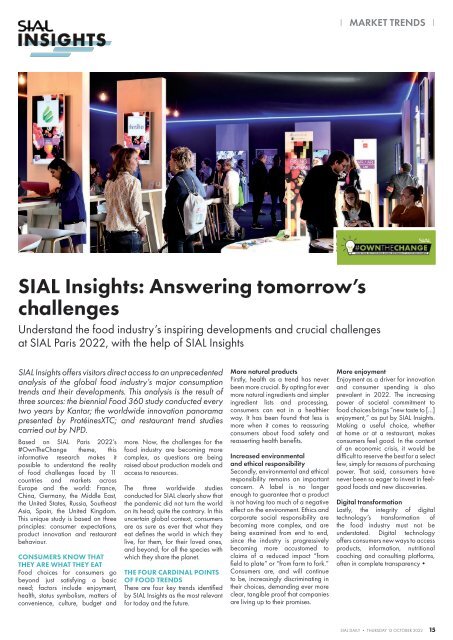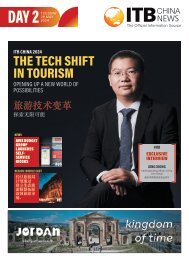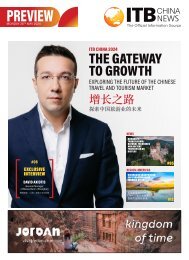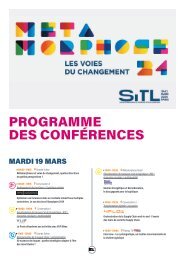SIAL Daily 2022 - Preview Edition
You also want an ePaper? Increase the reach of your titles
YUMPU automatically turns print PDFs into web optimized ePapers that Google loves.
I MARKET TRENDS I<br />
<strong>SIAL</strong> Insights: Answering tomorrow’s<br />
challenges<br />
Understand the food industry’s inspiring developments and crucial challenges<br />
at <strong>SIAL</strong> Paris <strong>2022</strong>, with the help of <strong>SIAL</strong> Insights<br />
<strong>SIAL</strong> Insights offers visitors direct access to an unprecedented<br />
analysis of the global food industry’s major consumption<br />
trends and their developments. This analysis is the result of<br />
three sources: the biennial Food 360 study conducted every<br />
two years by Kantar; the worldwide innovation panorama<br />
presented by ProtéinesXTC; and restaurant trend studies<br />
carried out by NPD.<br />
Based on <strong>SIAL</strong> Paris <strong>2022</strong>’s<br />
#OwnTheChange theme, this<br />
informative research makes it<br />
possible to understand the reality<br />
of food challenges faced by 11<br />
countries and markets across<br />
Europe and the world: France,<br />
China, Germany, the Middle East,<br />
the United States, Russia, Southeast<br />
Asia, Spain, the United Kingdom.<br />
This unique study is based on three<br />
principles: consumer expectations,<br />
product innovation and restaurant<br />
behaviour.<br />
CONSUMERS KNOW THAT<br />
THEY ARE WHAT THEY EAT<br />
Food choices for consumers go<br />
beyond just satisfying a basic<br />
need; factors include enjoyment,<br />
health, status symbolism, matters of<br />
convenience, culture, budget and<br />
more. Now, the challenges for the<br />
food industry are becoming more<br />
complex, as questions are being<br />
raised about production models and<br />
access to resources.<br />
The three worldwide studies<br />
conducted for <strong>SIAL</strong> clearly show that<br />
the pandemic did not turn the world<br />
on its head; quite the contrary. In this<br />
uncertain global context, consumers<br />
are as sure as ever that what they<br />
eat defines the world in which they<br />
live, for them, for their loved ones,<br />
and beyond, for all the species with<br />
which they share the planet.<br />
THE FOUR CARDINAL POINTS<br />
OF FOOD TRENDS<br />
There are four key trends identified<br />
by <strong>SIAL</strong> Insights as the most relevant<br />
for today and the future.<br />
More natural products<br />
Firstly, health as a trend has never<br />
been more crucial. By opting for ever<br />
more natural ingredients and simpler<br />
ingredient lists and processing,<br />
consumers can eat in a healthier<br />
way. It has been found that less is<br />
more when it comes to reassuring<br />
consumers about food safety and<br />
reasserting health benefits.<br />
Increased environmental<br />
and ethical responsibility<br />
Secondly, environmental and ethical<br />
responsibility remains an important<br />
concern. A label is no longer<br />
enough to guarantee that a product<br />
is not having too much of a negative<br />
effect on the environment. Ethics and<br />
corporate social responsibility are<br />
becoming more complex, and are<br />
being examined from end to end,<br />
since the industry is progressively<br />
becoming more accustomed to<br />
claims of a reduced impact “from<br />
field to plate” or “from farm to fork.”<br />
Consumers are, and will continue<br />
to be, increasingly discriminating in<br />
their choices, demanding ever more<br />
clear, tangible proof that companies<br />
are living up to their promises.<br />
More enjoyment<br />
Enjoyment as a driver for innovation<br />
and consumer spending is also<br />
prevalent in <strong>2022</strong>. The increasing<br />
power of societal commitment to<br />
food choices brings “new taste to [...]<br />
enjoyment,” as put by <strong>SIAL</strong> Insights.<br />
Making a useful choice, whether<br />
at home or at a restaurant, makes<br />
consumers feel good. In the context<br />
of an economic crisis, it would be<br />
difficult to reserve the best for a select<br />
few, simply for reasons of purchasing<br />
power. That said, consumers have<br />
never been so eager to invest in feelgood<br />
foods and new discoveries.<br />
Digital transformation<br />
Lastly, the integrity of digital<br />
technology’s transformation of<br />
the food industry must not be<br />
understated. Digital technology<br />
offers consumers new ways to access<br />
products, information, nutritional<br />
coaching and consulting platforms,<br />
often in complete transparency•<br />
<strong>SIAL</strong> DAILY • THURSDAY 13 OCTOBER <strong>2022</strong> 15

















